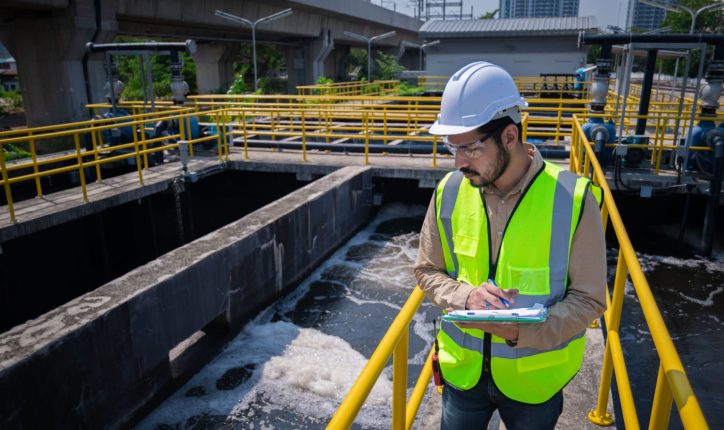Need Assistance? Call one of our experts today on: 0844 980 2218 Email: info@hflbuildingsolutions.co.uk
Need Assistance? Call one of our experts today on: 0844 980 2218 Email: info@hflbuildingsolutions.co.uk
Home/Why Health and Safety Should B...

175 Views
0 Comments
21 May 2025
Water maintenance is more than just a compliance task. It’s an essential part of ensuring health and safety for building occupants, especially in environments where water systems are complex or high-risk. Whether you’re managing a school, office building, hotel or healthcare facility, neglecting water hygiene can lead to serious health consequences, legal trouble and reputational damage.
At the heart of a successful maintenance programme is a proactive approach to managing risk, especially the risk of bacteria such as Legionella. This article explores why health and safety must be the foundation of your water maintenance strategy and how you can build an effective plan around it.
Water systems may look clean and safe from the outside, but inside they can host a range of potentially harmful bacteria if not maintained properly. One of the most notorious is Legionella pneumophila, the bacteria responsible for Legionnaires’ disease. This form of pneumonia can be life-threatening, particularly for vulnerable individuals such as the elderly, immunocompromised, or those with chronic respiratory conditions.
Legionella bacteria thrive in stagnant or lukewarm water, typically between 20°C and 45°C. This means systems such as hot and cold water tanks, cooling towers, spa pools and even infrequently used outlets can become breeding grounds if regular maintenance and monitoring are not in place.
In the UK, employers and those in control of premises have a legal obligation to assess and control the risk of exposure to Legionella. This falls under the Health and Safety at Work etc. Act 1974 and COSHH Regulations 2002, and is further supported by HSE’s Approved Code of Practice L8 (ACOP L8) and HSG274 technical guidance.
A crucial part of compliance involves completing a Legionella Risk Assessment, which must be reviewed regularly and whenever significant changes occur in the water system or building use. This assessment identifies potential sources of risk, evaluates current control measures and recommends any necessary improvements.
Failing to comply can result in enforcement action by the Health and Safety Executive (HSE), including prosecution, fines and, in severe cases, imprisonment. Beyond the legal implications, organisations can face claims from affected individuals and damage to brand trust.
Effective water maintenance requires more than annual checks or emergency callouts. It’s about continuous monitoring and proactive intervention. Key control measures include:
All of these steps should be documented clearly, forming part of a logbook or digital water hygiene record that can be accessed for audits or inspections.
There have been numerous high-profile cases where inadequate water maintenance has led to serious illness or death. These incidents highlight how easily bacteria can spread through systems like air conditioning units, decorative fountains or shower heads, especially in buildings with complex pipework or variable usage.
In addition to the human cost, the financial impact of an outbreak can be devastating. Businesses may face court cases, temporary closure, fines and expensive remedial work. Insurance premiums may rise and long-term damage to customer confidence is not uncommon.
Even in cases where illness does not occur, neglecting water hygiene can lead to pipe corrosion, scale buildup and system inefficiency—requiring costly repairs or replacements.
To reduce risk and ensure full compliance, it’s essential to follow industry best practices and tailor your water maintenance strategy to the unique needs of your site. This includes:
Modern solutions such as remote temperature monitoring and digital logbook systems can help automate and streamline many of these tasks, making it easier to remain compliant and responsive to risk.
Every property is different, which means your approach to water safety must be customised. For example, a hotel with many infrequently used guest rooms will have very different requirements from a busy warehouse or office. Schools and hospitals, where vulnerable people are present, require an even more robust programme of water hygiene management.
Partnering with a water hygiene specialist ensures your system is assessed correctly and the most appropriate solutions are applied. They can advise on system upgrades, correct usage and emergency procedures, giving you peace of mind that your site is protected.
Health and safety should never be treated as a secondary concern when it comes to water maintenance. A clean, well-maintained system not only keeps people safe but also supports your business continuity, reduces long-term costs and enhances your reputation.
By making health and safety the cornerstone of your water maintenance strategy, you’re not just meeting legal obligations—you’re actively creating a safer, more responsible and more efficient environment for everyone who enters your building.
Freeman House, Orbital 24, Oldham Street, Denton, Manchester M34 3SU